|
Printables |
PowerPoints |
Online exercises |
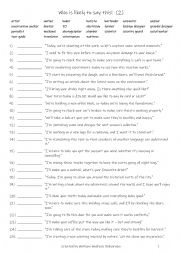
|
A2-B1 Who is likely to say this! (2)
Learning vocabulary for professions like journalist, mechanic. photographer and plumber is valuable because it helps people identify roles, understand career-specific responsibilities, and communicate effectively in different situations. Recognising job titles and what each profession involves supports clearer communication in daily life and improv...
Level: intermediate
Age: 8-100
Type:
Downloads: 118
|
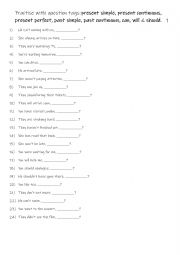
|
A2+-B1 Practise with question tags present simple, present continuous, present perfect, past simple, past continuous, can, will & should. 1
Learning question tags with various tenses (such as Present Simple, Present Continuous, Present Perfect, Past Simple, Past Continuous, Can, Will, and Should) helps students communicate more naturally and confidently in English. Question tags are used to confirm information or seek agreement, making conversations smoother and more engaging. Practici...
Level: intermediate
Age: 8-100
Type:
Downloads: 148
|
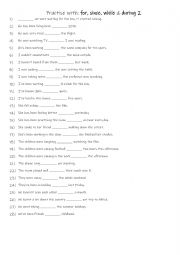
|
A2+-B1 Practise with for, since, while & during (2)
Learning to use for, since, during, and while is important because these words help student�s express time accurately in English, especially when talking about the duration and timing of events. For indicates the length of time an action takes place, while since pinpoints when an action started and continues until now, helping to show continuity. D...
Level: intermediate
Age: 9-100
Type:
Downloads: 111
|
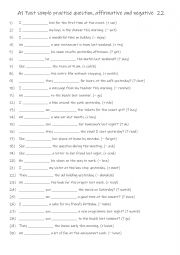
|
A1 Past simple practise question, affirmative and negative 2
Learning the past simple tense with questions, affirmative, and negative sentences is essential for students as it enables effective communication about past events. It provides a foundation for understanding grammar and constructing basic sentences, which is crucial for daily conversations. Mastering these forms ensures students can ask questions,...
Level: elementary
Age: 8-100
Type:
Downloads: 128
|
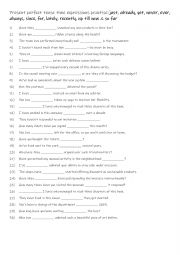
|
B1 Present perfect tense time expressions practise just, already, yet, never, ever, always, since, for, lately, recently, up till now & so far
Learning the Present Perfect tense with time expressions such as just, already, yet, never, ever, always, since, for, lately, recently, up till now, and so far helps students link past actions to the present, describe experiences, and specify time periods. It allows them to express when things happened, how long they�ve been happening, and the rele...
Level: intermediate
Age: 9-100
Type: worksheet
Downloads: 113
|
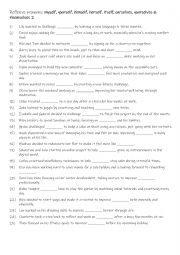
|
A2+-B1 Reflexive pronouns myself, yourself, himself, herself, itself, ourselves, yourselves & themselves 2
Learning reflexive pronouns is essential for effective communication and grammar accuracy, as they indicate when the subject and object of a sentence are the same (e.g., "I made myself a sandwich"). They also provide emphasis (e.g., "She did it herself") and enhance the complexity of sentences (e.g., "We enjoyed ourselves at the party"). Mastering ...
Level: intermediate
Age: 8-100
Type:
Downloads: 104
|
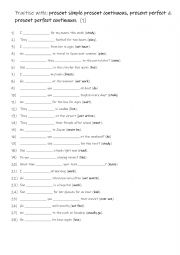
|
A2+-B1 Practise with present simple present continuous, present perfect & present perfect continuous (1)
Learning and practicing the Present Simple, Present Continuous, Present Perfect, and Present Perfect Continuous tenses is essential for clear communication in English. These tenses help students to express actions and events in different time frames�whether they are habitual, happening now, or linked to the past. Mastering these tenses improves acc...
Level: intermediate
Age: 8-100
Type:
Downloads: 105
|
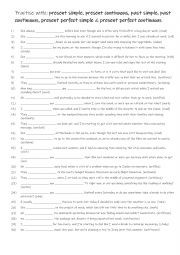
|
B1 -B2 Practise with present simple, present continuous, past simple, past continuous, present perfect simple & present perfect continuous
Learning tenses like the present simple, present continuous, past simple, past continuous, present perfect simple, and present perfect continuous is important because they allow students to express actions and events in a variety of time frames and contexts. The present simple is used for routines or facts (e.g., She works every day), while the pre...
Level: intermediate
Age: 9-100
Type:
Downloads: 122
|
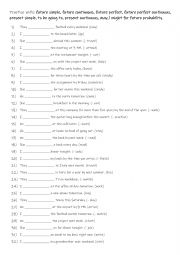
|
B1-B2 Practise with future simple, future continuous, future perfect, future perfect continuous, present simple, to be going to, present continuous, may / might for future probability.
Learning these future tenses and structures (future simple, future continuous, future perfect, future perfect continuous, present simple, to be going to, present continuous, may, and might for future probability) is crucial for students because they help express different types of future actions and possibilities. For example, the future simple is ...
Level: intermediate
Age: 8-100
Type:
Downloads: 110
|
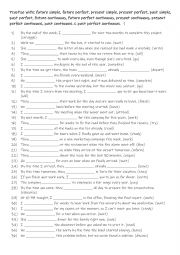
|
B1+-C1 12 Tenses 1
Students should practise these tenses because they are essential for expressing actions and events in different time frames, allowing for clear and precise communication. By mastering these tenses, students can talk about future plans (future simple), describe ongoing actions (present continuous, future continuous), and show the connection between ...
Level: intermediate
Age: 10-100
Type:
Downloads: 114
|
|
|
|
|












